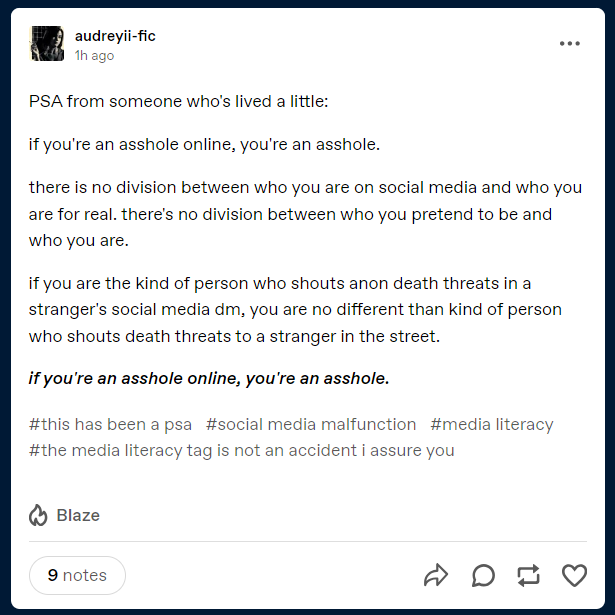this post was submitted on 22 Mar 2024
729 points (94.8% liked)
tumblr
3333 readers
1 users here now
Welcome to /c/tumblr, a place for all your tumblr screenshots and news.
Our Rules:
-
Keep it civil. We're all people here. Be respectful to one another.
-
No sexism, racism, homophobia, transphobia or any other flavor of bigotry. I should not need to explain this one.
-
Must be tumblr related. This one is kind of a given.
-
Try not to repost anything posted within the past month. Beyond that, go for it. Not everyone is on every site all the time.
-
No unnecessary negativity. Just because you don't like a thing doesn't mean that you need to spend the entire comment section complaining about said thing. Just downvote and move on.
Sister Communities:
-
/c/[email protected] - Star Trek chat, memes and shitposts
-
/c/[email protected] - General memes
founded 1 year ago
MODERATORS
you are viewing a single comment's thread
view the rest of the comments
view the rest of the comments

The post literally says, "If you are the kind of person who shouts death threats in a strangers social media dms, you are no different than [the] kind of person who shouts death threats to a stranger in the steeet." But we have over a decade of data showing that they are very different people, that anonymity and online detachment cause otherwise normal people to behave this way, and that awareness of the effects of this behavior can curb it. I get that the post is trying to create a moral equivalence, but A) that is simplistic view of digital aggression and B) calling people assholes online just contributes to digital aggression.
It's the anonymity which is the door opener. The assholeness was inside the whole time. Take away laws and law enforcement and then people will show their real faces. That's the point of the post.
This shares some similarities on how getting caught is a good deterret regarding crime rather than severity of punishment.
The flip side of that is that non-anonymous speech can't be trusted: there is no reliable way to determine whether the speaker is speaking truly, or just trying to avoid unpleasant consequences.
Again, no, studies show that it's more complicated than that; it's not just that anonymity lets people be assholes, but that anonymous online interactions cause people to behave differently. There are a lot of theories on why, like that non-verbal communication makes people assume the worst intentions in others, or that typing on an app makes you feel like you're talking with yourself, but it's definitely clear that anonymous online interactions don't just enable negative behavior, they create it.
People do the same thing when they're driving because of the pseudo anonymity you have when you're in a car.
That makes a lot of sense and I never put that together. I wonder if there have been any studies comparing road rage and online hostility.